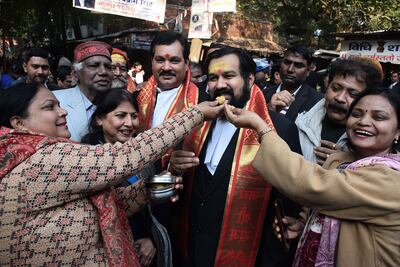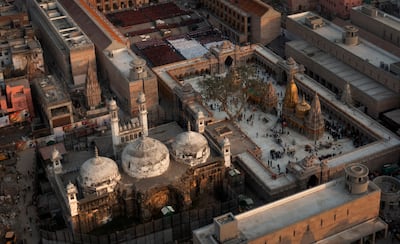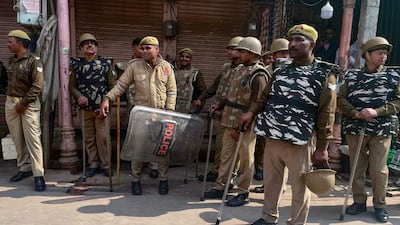Hundreds of riot police were deployed for Friday prayers at the Gyanvapi Mosque in the Indian city of Varansi, a day after Hindus conducted religious rituals inside the contested building's cellars for the first time in three decades.
The 17th century mosque, built by the Mughal emperor Aurangzeb, has been at the centre of a religious dispute as many Hindus claim that it stands on the grounds of a demolished temple.
On Wednesday a court granted Hindus the right to pray in the cellars of the mosque, which stands next to the 18th-century Kashi Vishwanath temple dedicated to the Hindu deity Shiva.
Heavy security was deployed as Muslims took part in the first Friday prayers at the mosque since the court ruling.
Around 2,500 Muslims prayed as police in riot gear guarded the site and Hindu devotees shouted “Har Har Mahadev” or “Hail Lord Shiva”.

Police turned away some Muslim, saying that the mosque was full, after many worshippers came to offer prayers in a show of support.
The mosque committee had asked Muslims who owned shops and businesses in the city to keep them closed as a peaceful protest against the court order.
“There is a heavy police deployment,” Shamsher Ali, a resident of Varanasi, told The National. “We are certain there will be peace. We want to offer prayers peacefully. The Hindus are entering from the other side, while we have a different entrance.”
“We were struggling in the crowd. Police were trying to control the people and had to ask them to go back home,” he said.
“I have been offering prayers here since my childhood but the scene was unusual today as there were many police personnel. But everything seemed normal once we entered the mosque,” said Rashid Ansari, another Muslim resident of Varansi.
The Varanasi district court this week ordered that one of the mosque's cellars, which had been sealed, be handed over “to the plaintiff and the priest named by the Kashi Vishwanath Trust Board”.

The court is hearing a petition asking that Hindus be allowed to offer prayers to “visible and invisible deities” inside the mosque complex.
The court gave the district administration a week to make arrangements. However the authorities in Uttar Pradesh, which is ruled by Prime Minister Narendra Modi's Hindu nationalist Bharatiya Janata Party, moved swiftly to remove fencing from the site overnight, enabling devotees to enter the complex.
Prayers started at around 3am and the priest said they will be offered five times a day. Many Hindu devotees have since offered prayers at the cellars and sung religious songs.
Hindus had been allowed to worship the deities carved on the outer wall of the mosque daily until 1993. Such rituals were restricted to once a year after Hindu nationalists demolished the Babri Masjid, another Mughal-era mosque, in 1992.
Four cellars were also sealed amid fears of unrest.
One of the cellars was allegedly in the possession of the Vyas family, a family of priests who claimed they conducted religious ceremonies in the basement, called Vyas Ka Tehkhana, before it was sealed.

The district court's order came a week after it received a survey report it had asked the Archaeological Survey of India to prepare to determine whether the Gyanvapi Mosque was “constructed over a pre-existing structure of a Hindu temple”.
The ASI's 839-page reportedly said it found evidence that the mosque was built over a Hindu temple.
The Anjuman Intezamia Masjid Committee, which manages the mosque, has rejected the claims and had sought to put an interim halt on the Hindu prayers in the Allahabad High Court.
The high court, however, on Friday refused to allow the committee's plea. Instead, it directed the state government to maintain law and order in the area.
“Please control the law and order situation there. No mishap should happen,” the court said in its order.

The All India Muslim Personal Law Board, a voluntary organisation of several Muslim groups, on Friday said that it was “deeply surprised and disappointed” in the Varanasi court’s judgment and would approach the Supreme Court and the President of India about the order.
“This matter goes without preserving the dignity of the court; it is also about safeguarding minority communities and marginalised sections from feeling deprived,” the board said in a statement.
Last month, Mr Modi inaugurated a grand temple dedicated to Lord Ram at the site of a demolished mosque in Ayodhya.


